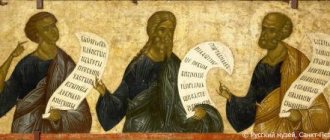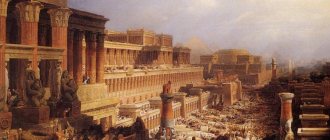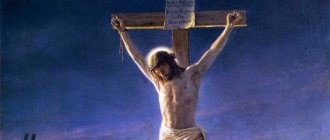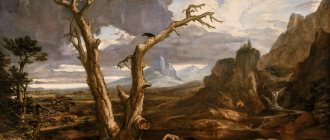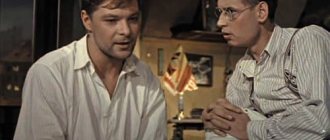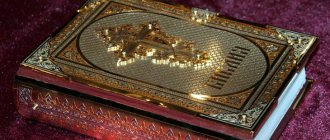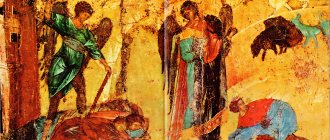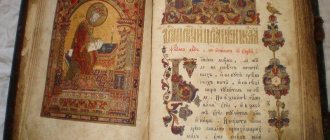Prophets in the Bible. The attitude towards the Book of books – the Bible – is complex. Some researchers believe that this is just a collection of myths, others believe that it was based on some real events. It seems that in light of the latest findings, the latter point of view is beginning to prevail...
“The most amazing thing about the Bible is that if you have it, you don’t need to guess - it will predict everything in advance. She can tell you about the world kingdoms that once existed, and those states that are yet to come. You can be sure: everything that is written in the Bible will come true!”
This is what believers say. Moreover – let’s clarify this separately – representatives of Christianity.
Many Orthodox Christians read Scripture all their lives, and each time they discover new insights and revelations. And that is to say, the work of many people was invested in this book; the experience of thousands of years is summarized in it. Now every line, every word is also consecrated by centuries-old traditions.
Many biblical expressions have become truly popular and are used as aphorisms, proverbs and sayings. Just remember:
“A time to throw stones and a time to gather stones”... “And the winds return to normal”...
"Vanity"…
“All rivers flow to the sea”...
“What was, is what will be”...
But all these are lines from Ecclesiastes.
Books of prophetic content make up almost a third of the entire Bible, starting with the Old Testament. Basically, the prophets of the Old Testament predicted the fate of the people of Israel, what punishment would await them if people did not repent of their sins.
In addition, the people turned to the prophets on a variety of occasions, believing that they could give advice, find a missing or stolen thing or animal, cure the sick and even raise the dead, and generally perform miracles, since these were not ordinary people, but chosen by God.
Many prophets even held the positions of “royal seers”; simply put, they were assistants, advisers, consultants, and even leaders of groups of consultants to kings and military leaders. Some of them were major politicians of their time, such as Jeremiah.
Moreover, not every prophet was given the courage to tell the king the truth, to warn him, or, as they would say now, “to give reliable information to make the right decision.” But there were some.
Let's start with the prophecies of Amos
Although he was a simple shepherd, he knew the Scriptures well and was quite an experienced and intelligent person. Here are some of his predictions.
“The people of Israel will be scattered throughout the entire Earth, but then the Lord will have mercy, and the restoration of the house of David will take place and the return of Israel to Palestine”...
“All the sinners of My people who say, “This evil will not befall us, neither will this evil come upon us,” will die by the sword.”
“Behold, the days will come, says the Lord, when the plowman will find the reaper, and the one who tramples the grapes will find the sower; and the mountains will flow with grape juice, and all the hills will flow.
And I will bring my people Israel back from captivity, and they will build up the deserted cities and settle in them, plant vineyards and drink wine from them, plant gardens and eat the fruits from them.
And I will establish them in their land, and they will no longer be pulled out of their land which I have given them, says the Lord your God.”
Agree, very good prospects for the people who, in the days that these lines are being written, are waging another war against terrorists who are firing missiles at Israel from both sides at once...
Major and minor prophets
According to the prophetic books in the Holy Scriptures, prophets are divided into great and small. The major ones are called: Isaiah, Jeremiah, Ezekiel and Daniel because of the vastness of the prophetic books they left behind. There are 12 minor prophets: Hosea, Joel, Amos, Obadiah, Jonah, Micah, Nahum, Habakkuk, Zephaniah, Haggai, Zechariah and Malachi.
They are called lesser because they left behind books of a smaller volume compared to the books of the greater prophets. The special subject of the predictions of the Old Testament prophets was the Messiah - Christ and the fate of the faith and the Church of Christ and the whole world.
Prophet Hosea
The prophet Hosea lived around the same time as Amos. He foresaw not only the coming renewal of the Israeli people, but also reproached the Israelis for their wickedness and sinfulness.
“Oathing and deceit, murder and theft, and adultery have become extremely widespread, and bloodshed follows bloodshed,” he states.
And then he continues:
“For this reason this land will mourn, and all who live on it will faint, including the beasts of the field and the birds of the air, even the fish of the sea will perish.”
As you can see, according to this prediction, the prospects for the Israelis are completely gloomy. It’s good that this verdict is apparently not final. The prophet Hosea intercedes for his people and says:
“I will be dew to Israel; it will blossom like a lily and take root like Lebanon. Its branches will spread out, and its beauty will be like olive trees, and its fragrance will be like Lebanon.
Those who sat under his shadow will return, they will have an abundance of grain, and they will flourish like the vine, and they will be as glorious as the wine of Lebanon.”
Final Thoughts
I love prophecy and prophetic ministry. I believe in its reality! And I also believe that we need to sharpen our theology on the issues of prophets and prophecy, and have greater accountability and responsibility so that we can better serve the Body of Messiah. We need to hear from God in our day.
Author - Ron Cantor / messiahsmandate.org Translation - Anna Ivashchenko for
Donate Last: 02/28. Thank you!
Subscribe: Telegram • Facebook • • • Twitter • Instagram • Youtube
Prophet Iola
Little is known about the prophet Joel. He made his prophecies when two disasters occurred at once: a plague of locusts and a severe drought. The prophet considered these disasters a threatening warning from God. The people must repent, for the day of the wrath of the Lord is near:
“Blow the trumpet in Zion and sound the alarm in My holy mountain; Let all the inhabitants of the earth tremble, for the day of the Lord is coming, for it is near - a day of darkness and gloom, a cloudy and foggy day: like the dawn spreading over the mountains, a numerous and strong people, such as has not happened since the beginning of time and will not be thereafter for generations.
Before him the fire consumes, and behind him the flame burns; Before him the earth is like the Garden of Eden, but behind him there will be a desolate steppe, and no one will be saved from him.”
However, Joel was still confident that God’s love for people is limitless and that only it is the path to salvation for all who call on the name of God.
“Gather the people, call an assembly, invite the elders, gather the youths and sucklings; Let the groom come out of his palace and the bride from her upper room,” he called out to the people. And further:
“And on Mount Zion there will be salvation, and it will be holy; and the house of Jacob shall take possession of their inheritance. And the house of Jacob shall be fire, and the house of Joseph as flame, and the house of Esau as stubble: they shall burn it, and destroy it, and none shall be left of the house of Esau: for the Lord hath spoken it.
And those to the south will take possession of the mountain of Esau, and those in the valley will take possession of the Philistines; and they will take possession of the field of Ephraim and the field of Samaria, and Benjamin will take possession of Gilead.
And those who were exiled from the army of the children of Israel will take possession of the land of Canaan as far as Zarephath, and those who were exiled from Jerusalem, who are in Sepharad, will take possession of the cities of the south.”
Prophet Elijah
Elijah, on the contrary, is considered one of the most famous prophets. Even as a child, he devoted himself to the Lord and began to live in the desert. During the reign of King Ahab, Elijah was called to prophetic ministry.
Elijah began to actively persuade the people to the true faith and deliverance from sins. And this was very opportune, since at that time the people’s fascination with pagan idols was great. According to legend, Elijah ordered the construction of two altars: one for the priests of the idol of Baal, the other for serving the True God.
Elijah proposed this test:
“On whichever of them fire falls from heaven, that will be the indication whose God is true, and all will have to worship Him, and those who do not acknowledge Him will be put to death.”
No matter how much the priests of Baal prayed, no fire naturally came down on their altar.
Then the holy prophet Elijah got down to business. He prayed to the Lord, and a fire began to burn on the altar. The people, seeing such a miracle, fell to the ground, crying:
“Truly the Lord is One God, and there is no other God besides Him!”
Then the prophet Elijah killed all the priests of Baal and began to pray to the Lord to send rain. His prayers were answered and the drought ended.
They say that because of his fiery faith, the prophet Elijah did not die, but was taken to heaven while he was still alive. Before this, the Lord ordered the prophet Elijah to transfer his prophetic gift to the prophet Elisha. Elijah anointed him with oil, and then Elisha witnessed the prophet Elijah’s ascent to heaven in a fiery chariot and received, along with his cloak that fell from the chariot, “a gift twice as great” as the prophet Elijah had.
Warning
After Paul lays out his clear teaching on prophecy, he makes it clear that if you disobey this teaching and reject it, you are not a prophet.
“Whoever considers himself a prophet or a spiritual person must admit that everything that I write to you is an institution of the Lord Himself. If anyone does not acknowledge this, do not acknowledge him either.” (1 Cor. 14:37-38; NIV)
This is a good illustration of the fact that prophets were not to serve outside apostolic control. Paul, the apostle, uses his apostolic authority to influence the issue of prophecy, prophets, and order in the New Testament ministry of worship. There is a reason why Paul in 1 Cor. 12, when listing ministers in communities, names apostles before prophets. Prophets must be under authority for their own good and the good of their hearers. An apostle does not have the flamboyant gift of a prophet, but he has the wisdom to lead a prophet in a team.
Note: John and the two witnesses are exceptions, and for a reason. John wrote New Testament biblical prophecy as the author of the apostolic scripture, and the two witnesses of Revelation 11 do not come as communal prophets in the form given in Eph. 4:11, but by becoming like the Old Testament prophets. There is a reason John said that no one could add anything to his words—to prevent future prophets from influencing Scripture.
Prophet Jonah
The prophet Jonah is known primarily for the fact that he did not want to prophesy to the inhabitants of the city of Nineveh that the Lord had prepared a terrible punishment for them for their sins. He decided to escape, for which he was punished - swallowed by a whale. Then, willy-nilly, Jonah repented of his disobedience, and after crawling out of the whale’s belly, he went to Nineveh.
“And Jonah began to walk around the city, as far as he could go in one day, and preached, saying: Forty more days, and Nineveh will be destroyed! And the Ninevites believed God, and declared a fast, and put on sackcloth, from the greatest of them to the least of them.
This word reached the king of Nineveh, and he rose from his throne, and took off his royal vestments, and put on sackcloth, and sat down on ashes, and commanded that it be proclaimed and said in Nineveh in the name of the king and his nobles: “Whatever people, neither cattle, nor oxen, nor sheep, did not eat anything, did not go to pasture and did not drink water, and that people and cattle were covered in sackcloth, and cried out loudly to God, and that everyone turned from their evil way and from violence their hands.
Who knows, maybe God will have mercy and turn away His burning anger from us, and we will not perish.”
And God saw their deeds, that they turned from their evil way, and God regretted the disaster that He said He would bring on them, but He did not bring it.”
However, such an ending, oddly enough, does not suit Jonah himself, who was expecting the spectacle of divine retribution. Then, to console him, the Almighty quickly grew a plant, in the shade of which Jonah was able to hide from the heat. But then a worm appears and eats away at the plant, and it withers. Jonah begins to succumb to the heat and regrets the loss of the plant. To which God says to him:
“You regret a plant that you did not work on and that you did not grow, which grew in one night and disappeared in the same night.
Should I not have pity on Nineveh, a great city, in which there are more than one hundred and twenty thousand people who cannot distinguish their right hand from their left, and a multitude of cattle?
Prophetesses
In addition to prophets, prophetesses are also known in the Bible (Ex. 15:20); (2 Kings 22:14); (2 Chronicles 34:22); (Neh.6:14); (Judges 4:4), the apostle later confirmed that for God “there is neither male nor female” (Gal.3:28), however, female prophetesses are most likely the exception.
In the Old Testament, three names stand out: Miriam, the sister of Moses (Exodus 15:20), Deborah, the only woman among the judges, who was so strong in spirit that she led the liberation of her people from the Canaanite tribes (Judges 4:4) and Huldah, who predicted wrath God for “burning incense to other gods,” and she promised the Jewish king Josiah for his humility that the Lord would accept him to his fathers and he would be laid in a tomb in peace and his eyes would not see the disasters of his country (2 Kings 22:14-20 ); (2 Chronicles 34:22,28).
Among the chosen women are Sarah, the wife of Abraham, the foremother of God’s chosen people, and Anna, the mother of the prophet Samuel, with her amazing song of thanksgiving and prayer to God (1 Samuel 2:1-10) and another Anna the prophetess, the daughter of Phanuel, from the tribe Asher, mentioned in the Gospel (Luke 2:36-38), as well as Abihail, the wife of Rehoboam, the niece of David (2 Chronicles 11:18), also Hadassa, aka Esther (Esther 2:7), there are others - a prophetess Isaiah also called his wife (Is. 8:3).
According to the Bible, only a person from the Jewish people could be a messenger of God, because God chose prophets from among His own:
“These nations, whom you are driving out, listen to fortunetellers and soothsayers, but the Lord your God has not given you that. The Lord your God will raise up for you a prophet from among you, from among your brothers, like me; you shall listen to Him” (Deut. 18:14-15).
Spellcasters
The influence of Jehovah's prophets extended to other nations, and they carried God's word to other tribes. God tells Jeremiah that He has not appointed him a prophet to a nation, but to the nations (Jer. 1:5). However, the text of the Bible names the names of foreign prophets from other nations (1 Kings 18:25,29,40,19:1; 2 Kings 10:19), but the term “navi” is not attached to them, but it is applied to them a special term designating pagan prophets - “kazemim” (Deut. 18:10,14; 1 Sam. 6:2, etc.) from the verb kasam - to conjure.
The figure of Balaam, the son of Beor from Mesopotamia, stands apart. He, being a soothsayer and having loved “the wages of unrighteousness” (2 Pet 2.15), went for money to serve the Moabite king Balak, who ordered him to curse Israel (Num. 22:5). But, instead of what people intended, the opposite happened. Even the donkey on which Balaam was riding spoke in a human voice, because it did not want to carry him, seeing the formidable Angel blocking the way. So, even though Balaam was not “Navi”, but only “Kazemim”, he served God’s will and His plan, and, having heard God’s command, blessed the people of Israel, pronouncing with blessing the true prophecy about the star of Jacob and the rod of Israel (Numbers 24.17-19).
Prophets in the Bible video
THE END OF THE WORLD IS SOON! | Terrible prophecy of the Bible!
The Revelation of the Apostle John the Theologian completes the Bible and describes his visions associated with the end of the world. Over 2000 years, many...
Predictions of Jesus Christ part - 1 /Bible
Predictions of Jesus Christ part - 1 / Bible.
Apocalypse. The end of the world story? | Bible mysteries
———————————————————————————————————— The video contains copyrighted content.
The third prophecy about the end of the world is fulfilled in Jerusalem
Brief navigation through the list of Biblical characters:
OLD TESTAMENT
NEW TESTAMENT
|
